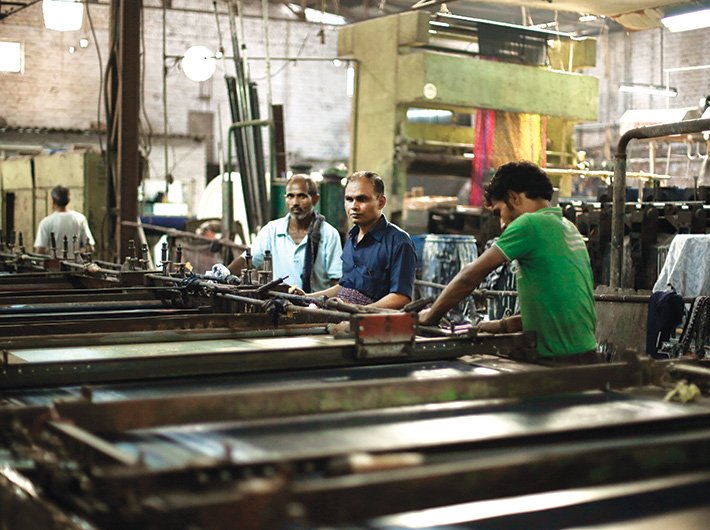We have to strengthen the labour movement and educate workers so that they defend not only their immediate economic demands but also the policies to save their rights
May Day is an occasion to take stock of the situation as far as workers are concerned. The day refers to the struggle in 1886 in Chicago, where the demand was of eight hours of work, eight hours of rest and eight hours of recreation. The essence of the whole demand was that there should be a limit to the exploitation of workers. Before mechanisation, it used to be a dawn-to-dusk affair for workers. But when electricity was invented and machinery came into existence, workers fought against electric bulbs, as they had to continue working even late at night.
May Day is an occasion to celebrate trade union, at least for those who believe in it. I say this because there is a section in the government, and trade unions as well, which does not accept May Day as such. Even the government of the USA doesn’t consider this as a holiday. Only a section of workers in the USA take up this cause of May Day.
In India everybody talks of May Day, though they don’t accept its revolutionary essence of fighting against exploitation of workers. Here, the trade union movement started in the early 20th century; by 1918 we had formal trade unions, in 1923 May Day was first observed in Chennai and by 1926 we had a trade union Act. But today, the situation of the working class is critical. Every time workers face a problem they have to organise themselves, they have to resist and fight.
Even during the pre-independence era, workers organised themselves, struggled, and forced the British government to enact certain legislations to safeguard their interests. The British workers and their legacy had an impact on a colony like India. After the constitution was adopted in 1950, India was projected as a welfare state and workers struggled to demand their rights.
Today, everybody questions the need of 44 labour legislations in the central sphere. But we need to understand that these legislations have been fought for at every step. Be it those related to social security or industrial dispute, they all came at different stages of demands from workers and after bitter struggles.
Till 1991, the labour department was considered to be the labour welfare department. But 1991 onwards, with the background of the international developments and introduction of neo-liberal policies in India, workers came under attack where many existing benefits were either stopped or the government made serious efforts to amend those. The government started talking about ‘reforms’ and ‘right-sizing’ (read downsizing) workers. But because of the political situation they could not make much change in it at that time.
From 1991 to 2014, the governments could not make much effort in changing labour laws. But there have been serious efforts to attack the rights of workers. So much so that even the formation of a trade union has become a serious problem over the years.
Earlier also there were struggles; there were anti-union actions by managements. But 1991 onwards, even the government was fully on the side of the management. There were serious problems in any effort to form a trade union. The right to form association and the right to collective bargaining are part of our constitution. The conventions of the International Labour Organisation (ILO) also acknowledge the right to organise (No. 87) and the right to collective bargaining (No. 98).
The government of India is part of ILO and was one of its founding members. India was the only colonial country which was a founding member and even has a permanent place in the governing body in the organisation from its inception. But still these two conventions have never been ratified by India. Even ILO is campaigning for the ratification of these two conventions in our country. There has been massive victimisation of workers in the last 20 years on the question of forming unions of their choice.
It has been seen that wherever new industries were established, the management did not want a trade union to come up. Even international investors saw labour laws as the biggest hurdle and they pressurised the government against it. They even saw this as a hurdle against employment opportunity and they spread the message among the younger generation that it was because of trade unions that they were not getting employment opportunities.
From the Narasimha Rao government to UPA II, every government wanted to bring changes in labour laws but either because of the political situation or because of the combination within parliament, they could not do so. But the current government, immediately after taking charge, has started attacking trade unions and making serious efforts to dilute labour laws. Reform is a good word, but it has become the most hated word as far as workers are concerned. We respected social reformers and we wanted reforms but now no worker will ask for a reform because for him reform means changing for the worse.
Relevance of trade unions
The slogan that there is no relevance of trade unions is not only used in India, but has also become powerful in the developed world. Even in Europe and the USA, workers are under attack – wages are being reduced and working hours increased. Other benefits, including social security and pension, are also under attack. Massive strikes and struggles are going on in Europe and the USA.
Now there is a new concept of ‘zero-hour’ contract, where the worker is not guaranteed how many hours of work he will be given, and it will be decided by the employer. It has come up in the European countries, especially in the UK, and it should be seen as a warning for Indian workers as well where work can be on an hourly basis and on many days he/she may not get work at all.
Only 5-7 percent of the workforce in India is in the organised sector and within this, 50-60 percent of the workers, including those working in Maharatna and Navratna public sector companies, are working on contract. So, the informal nature of the job has spread to even the organised sector, both in private and public.
Trade unions, in that sense, are in a defensive position. They are not able to advance from the existing positions but are defending whatever exists today. Their relevance is much more today because whatever they have achieved after the struggle of more than 100 years is under attack and those achievements have to defended.
The Indian situation
Even before the BJP-led NDA came to power in the centre, the BJP government in Rajasthan made amendments to labour laws. And the prime minister’s office has now given a direction to other state governments to follow the Rajasthan model. Already the state governments of Andhra Pradesh, Maharashtra, Gujarat, Haryana, Chhattisgarh and Madhya Pradesh have either started working in this direction or have already implemented the changes – all of which are against the interests of workers. In effect, majority of workers have been taken out of the purview of labour laws.
There have been serious efforts to further dilute the existing laws. We are reaching a stage where the relevance of the labour department itself is under attack and it is becoming redundant.
From September 2009 onwards, all the 11 central trade union organisations and various federations which are not part of these trade unions, like those in banks and insurance sectors, have come together and are fighting for a 10-point charter of demands, which is not for any immediate economic relief to workers, but is a voice against the policies. They are raising issues like price rise, demanding employment opportunity and implementation of labour laws and ratification of ILO conventions and more than 12 crore workers have participated in the countrywide strike actions, the last one being a 48-hour general strike.
Another biggest challenge is the rights of scheme workers, including those working under anganwadi, accredited social health activist (ASHA), mid-day meal and other schemes. There are around one crore workers who are not treated as workers but as volunteers with honorarium. They are doing really important work, but they are not even paid 50 percent of the notified minimum wages. When workers are facing this sort of situation, the relevance of the trade union becomes much more than what it was earlier.
In 2008, we enacted a new law to provide social security for workers in the unorganised sector. The only decision on social security was the implementation of the Rashtriya Swasthya Bima Yojana (RSBY) which gave a medical insurance benefit of '30,000 but mainly to those in the below poverty line (BPL) category. In the first year '1,000 crore was allocated in the budget but even that was not spent properly and the scheme was not properly implemented.
In the name of opening up the economy, all benefits are being given to private players. Trade unions today are more relevant, not only to defend the interests of the workers and their existing benefits or to increase wages, but also to raise voice against such policies, which are against the working people as a whole.
Trade unions have been protesting against these policies since 2009. And in 10 months of the new government, we had to speak against the unilateral decisions being taken by the government on issues related to workers. The government is not listening to us. How could the finance minister of the country say in his budget speech that he would appropriate '6,000 crore from the EPF to build a senior citizen welfare fund? What is the right of the government to take away the corpus of these accounts? Who gave them the authority to use this money? It is the workers’ money; there is no contribution of the government.
And then he talks of giving an option between EPF and the new pension scheme (NPS), the employee’s state insurance (ESI) or a health insurance product. EPF and ESI are social security schemes whereas NPS is only a tool for saving. Though the functioning of these social schemes needs to be improved, they give certain social security to workers. The compulsory nature of the EPF and ESI in a country where the older generation does not have anything – and where the government had to enact that if the children of the ageing parents do not look after them they will be punished – becomes more relevant. But the government wants to change social security schemes to a savings scheme so that money can be put into the share market. Trade unions have unanimously rejected this proposal.
Revival of trade unions
In the Indian context, the number of members of unions are on the increase. But the huge majority of the working people are not yet unionised. Trade unions should get strengthened both in their membership and also in their capacity to struggle to resist these policies and defend workers’ interests. A struggle is needed, not only to press for immediate economic demands, but also against the policies of the government that forms the basic cause of attack on their livelihood and their hard won rights. Trade unions should be able to unify various sections of working people and conduct struggles.
I am of the firm opinion that trade unions are more relevant today more than any other time. May Day is an occasion to rededicate ourselves to the cause of workers and fight against the exploitation of working people.
(As told to Jasleen Kaur)
Padmanabhan is president of CITU.

